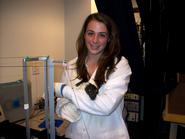
"Who wouldn't want to know how the mind works?" Morgan Williams '11 asked, as if people are not perplexing enough without the complication of neurons and synapses. She is a rising junior majoring in neuroscience, and this summer she is working with Stone Professor of Psychology and Director of the Neuroscience Program Douglas Weldon.
Her project, titled "The Neurobiology of Frustration," will survey the part of the brain that controls aggression. Frustration and aggression are linked, so they will work with the serotonin receptor 5-HT1B to see how they can curtail the negative affects that come with that relationship.
In humans, the inhibitory influence of 5-HT1B receptors on drinking and fighting has proven to be an effective tool for combating aggression. Similarly, a lack of the serotonin receptor 5-HT1B in rats increases hostile behavior and preference for alcohol. Therefore, 5-HT1B monitors serotonin release and helps placate the rats Williams is using in the lab. However, she can instigate frustration through non-reinforcement techniques from previous studies. She can also drive alcohol-heightened aggression through anpirtoline, a 5-HT1B agonist. An agonist is a type of ligand or drug that alters the activity of a receptor. The agonist anpirtoline binds to the receptor site in place of serotonin and creates a chemical effect.
Williams is combining non-reinforcement techniques with daily anpirtoline dosages to see if the rats in her lab will be frustrated when confronted with obstacles or deprived of rewards. She has a maze set up through which each of the 16 rats will run. Every day of experimentation will involve six maze trials – three reinforcement and three non-reinforcement. So far, she and Weldon have seen that as the dosage of anpirtoline increases, running speeds in the runway decrease, a sign that the rats have become more lax and less frustrated when they are not provided with reinforcement. Further research should tell them whether or not the anpirtoline is acting on the one receptor or if it is inadvertently affecting other receptors as well.
Ever since she took the Brain and Behavior course her freshman year, Williams has been fascinated by the brain's faculty and precision. She says this study is important because it will help scientists understand why and how people become frustrated. Her research is doubly vital because she needs all of the experience she can get if she wants to become a pediatric surgeon. Her ultimate goal is to work for Doctors Without Borders, an international medical humanitarian organization that is impartial to political parties or coalitions.
Her project, titled "The Neurobiology of Frustration," will survey the part of the brain that controls aggression. Frustration and aggression are linked, so they will work with the serotonin receptor 5-HT1B to see how they can curtail the negative affects that come with that relationship.
In humans, the inhibitory influence of 5-HT1B receptors on drinking and fighting has proven to be an effective tool for combating aggression. Similarly, a lack of the serotonin receptor 5-HT1B in rats increases hostile behavior and preference for alcohol. Therefore, 5-HT1B monitors serotonin release and helps placate the rats Williams is using in the lab. However, she can instigate frustration through non-reinforcement techniques from previous studies. She can also drive alcohol-heightened aggression through anpirtoline, a 5-HT1B agonist. An agonist is a type of ligand or drug that alters the activity of a receptor. The agonist anpirtoline binds to the receptor site in place of serotonin and creates a chemical effect.
Williams is combining non-reinforcement techniques with daily anpirtoline dosages to see if the rats in her lab will be frustrated when confronted with obstacles or deprived of rewards. She has a maze set up through which each of the 16 rats will run. Every day of experimentation will involve six maze trials – three reinforcement and three non-reinforcement. So far, she and Weldon have seen that as the dosage of anpirtoline increases, running speeds in the runway decrease, a sign that the rats have become more lax and less frustrated when they are not provided with reinforcement. Further research should tell them whether or not the anpirtoline is acting on the one receptor or if it is inadvertently affecting other receptors as well.
Ever since she took the Brain and Behavior course her freshman year, Williams has been fascinated by the brain's faculty and precision. She says this study is important because it will help scientists understand why and how people become frustrated. Her research is doubly vital because she needs all of the experience she can get if she wants to become a pediatric surgeon. Her ultimate goal is to work for Doctors Without Borders, an international medical humanitarian organization that is impartial to political parties or coalitions.
